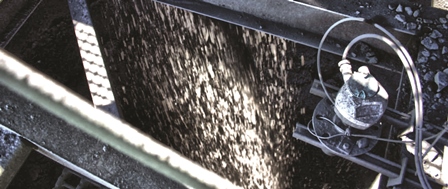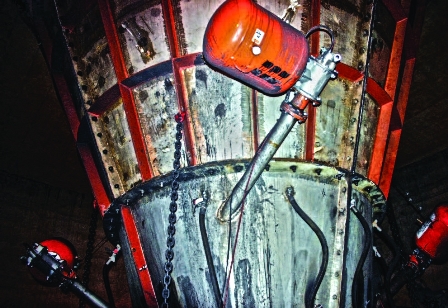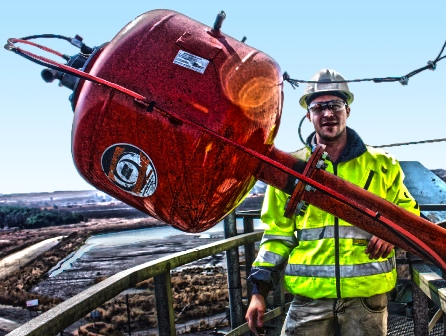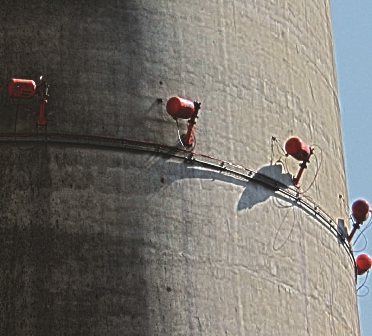Phola Coal Handling Facility Uses Hurricane Air Cannons
Published: July 2nd 2013
 [Mpumalanga, South Africa] – A high-volume coal handling operation in South Africa has solved material build-up problems in the transfer chute feeding its export silo and discard bin with a strategically-timed series of air cannons that blast the accumulation from chute and vessel walls, preventing bottlenecks and maintaining throughput rates. The air cannons from Martin Engineering are credited with eliminating the blockages, which became so severe at times that the conveyor had to be shut down until the mass could be dislodged, effectively halting the entire process.
[Mpumalanga, South Africa] – A high-volume coal handling operation in South Africa has solved material build-up problems in the transfer chute feeding its export silo and discard bin with a strategically-timed series of air cannons that blast the accumulation from chute and vessel walls, preventing bottlenecks and maintaining throughput rates. The air cannons from Martin Engineering are credited with eliminating the blockages, which became so severe at times that the conveyor had to be shut down until the mass could be dislodged, effectively halting the entire process.
 A 50/50 joint venture between Anglo American Inyosi Coal (AAIC) and BHP Billiton Energy Coal South Africa (BECSA), the Phola coal processing plant is fed equally by AAIC’s Zibulo Colliery and BECSA’s Klipspruit Mine. The twin-module coal washing operation delivers a throughput of nearly 1,200 tons per hour from each module. The $450 million plant features two mineral sizers, a rotary breaker and two 8,500 ton silos, as well as four stackers and three bucket wheel reclaimers.
A 50/50 joint venture between Anglo American Inyosi Coal (AAIC) and BHP Billiton Energy Coal South Africa (BECSA), the Phola coal processing plant is fed equally by AAIC’s Zibulo Colliery and BECSA’s Klipspruit Mine. The twin-module coal washing operation delivers a throughput of nearly 1,200 tons per hour from each module. The $450 million plant features two mineral sizers, a rotary breaker and two 8,500 ton silos, as well as four stackers and three bucket wheel reclaimers.
“Although much of the plant’s equipment is of industry-standard design, the operation is much larger than traditional South African modular facilities,” commented Richard Kenny, BHP Billiton’s Project Director for Klipspruit. “For example, the 4,3 m × 8 m multi-slope vibrating screens are the biggest in the country.”
 The Challenge
The Challenge
Like many newer facilities, the facility does not maintain its fines in a wet slurry for environmental reasons, instead filtering the dry fugitive particles and pressing them into cakes. Depending on the customer’s requirements, the cakes are either added to the outgoing product load or sent to the discard bin via conveyor for storage.
Soon after the plant went online, the process began delivering a throughput of more than a million metric tons per month, well on the way to its target of 16 million annually. On its busiest day of that first year, the facility completely loaded eight 100-car trains, each car with a capacity of 84 tons.
 But as the high-volume operation ramped up, engineers started noticing bottlenecks. They traced the slowdown to material build-up in the chute feeding the export silo and discard bin. Operators determined that the freshly-pressed cakes were sticking to the walls of the chute, narrowing the space for product transfer and leaving “rat holes” which restricted flow. As the blockage grew, it would cause the vessels to fill with material and eventually trip the high level indicator, shutting off the conveyors and forcing downtime for manual cleanout.
But as the high-volume operation ramped up, engineers started noticing bottlenecks. They traced the slowdown to material build-up in the chute feeding the export silo and discard bin. Operators determined that the freshly-pressed cakes were sticking to the walls of the chute, narrowing the space for product transfer and leaving “rat holes” which restricted flow. As the blockage grew, it would cause the vessels to fill with material and eventually trip the high level indicator, shutting off the conveyors and forcing downtime for manual cleanout.
System downtime in such a high-volume operation is catastrophic, and Phola immediately began researching possible solutions. Operators met with representatives from Martin Engineering South Africa, who suggested adding a series of air cannons to address the issue.
“Even well-designed processes can experience accumulations, which have a significant impact on output and profitability,” observed Chris Schmelzer, Global Design Engineering Manager for Martin Engineering. “Changes in process conditions, raw materials or weather can all have an effect on material flow, and even small amounts of accumulation can grow into a serious blockage.”
Air cannon technology has a long history of service in coal handling and processing, helping to improve material flow and reduce maintenance. The timed discharge of a directed air blast can prevent accumulation or blockages that impact process efficiency and raise maintenance expenses, helping manufacturers minimize the need for process interruptions and manual labor.
Results
To address the blockage, Martin Engineering recommended 70-liter Hurricane Air Cannons, placed in strategic locations to knock down the filter cake within the chute. Positioning of the cannons and nozzles is critical to their success, and the technicians installed the four units at a 35º downward-facing angle for maximum effectiveness in this application.
The patented design is engineered to enhance material flow with greater force and faster cycling than traditional valve designs. The cannons fire only when the exhaust valve opens in response to a positive surge of air sent by a solenoid or PLC control. This positive-acting valve amplifies the discharge, providing up to 50% more force than a standard air cannon of the same size. In addition, the improved air path fills the reservoir 3-4 times faster than typical designs.
“The air cannons have proven very effective at blowing the filter cake from the edges of the discard chute, allowing the plant to maintain the output levels for which it was designed,” Kenny said. “Finding a workable solution to the build-up was a huge relief.”
With production rates continuing to rise, Phola has commissioned another series of cannons to further improve the material flow inside the discard bin. The company is currently awaiting installation of a larger air compressor to manage the additional load.
 The Challenge
The Challenge